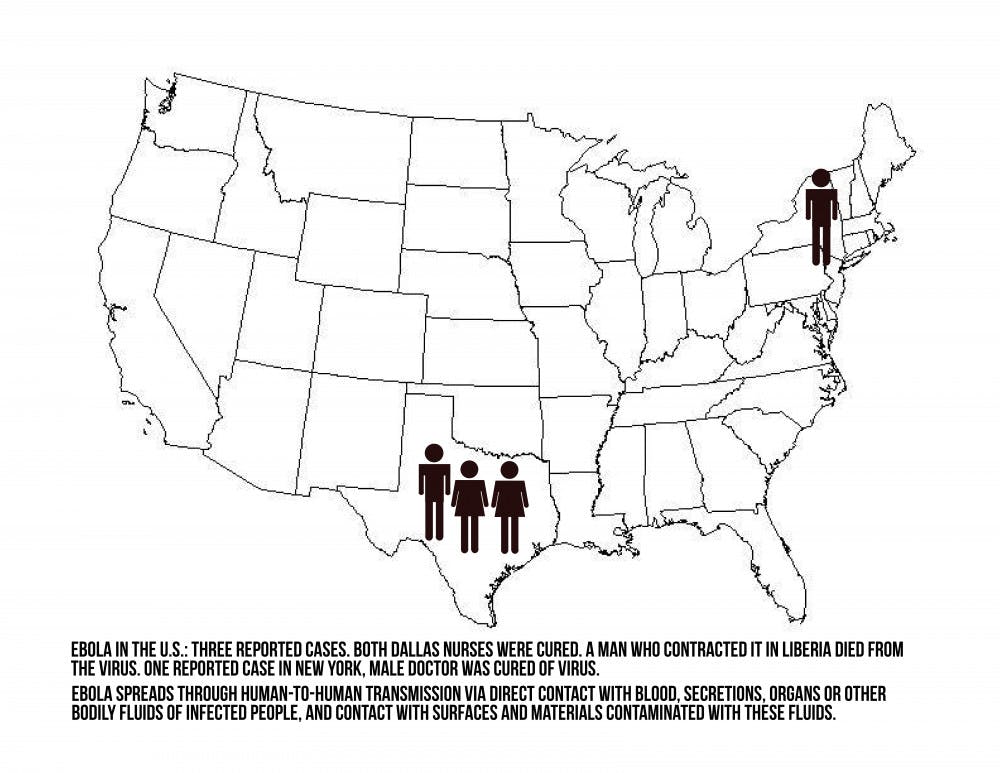On Oct. 30, Michael Geisler, vice president for Language Schools and Schools Abroad, Chief Risk Officer, and Professor of German and Dr. Mark Peluso, the College Medical Director and College Physician, sent out a school-wide “Important Ebola Update.”
The message included new policies that will be instituted to minimize the threat of Ebola to students on campus and abroad. It said, “Effective immediately…Middlebury will not support sponsored travel to countries identified by the Center for Disease Control as high-risk areas.”
This means that the College will offer neither credit nor assistance to students, faculty or staff who perform any type of activity in Guinea, Liberia or Sierra Leone, the only exception being if the community member can provide evidence that they have “special expertise and training to assist in the humanitarian effort.” If a College community member were to travel to any of the high-risk areas, they would be required to abstain from returning to campus for 21 days — the maximum amount of time the virus takes to incubate.
This announcement comes on the heels of months of sensational news headlines, most of which have focused on the few cases that have been diagnosed in America. The severity of the virus and the lack of readily available cures have unquestionably contributed to the media circus.
Despite the amount of attention the American Ebola outbreak has gotten in the media, both Geisler and Peluso insist that the threat of an on-campus outbreak is incredibly low, especially with the College’s new policies.
Peluso said, “The risk of getting infected with Ebola is extremely low at this time…with Middlebury’s policy of asking people to wait for 21 days before returning to campus, the risk of someone becoming sick on our campuses and spreading diseases is extremely low.”
Regardless of the incredibly low risk of an Ebola case on any of the College’s campuses, members of the College Emergency Planning and Preparedness Team and the Emergency Core Team decided that it would be helpful to notify the community of the travel restrictions to Guinea, Liberia and Sierra Leone while also informing them of the required 21-day leave from campus that a community member must take upon return from one of these countries.
If a community member were to disregard the new policies set forth and return to campus immediately after coming into possible contact with the Ebola virus, the College would be prepared. Peluso said that the team would “ask the person to stay where they were, and immediately notify the Vermont Department of Health. Consultation with infectious disease experts and CDC would quickly determine the next steps, and Vermont is prepared to transport and treat people with possible Ebola virus disease.”
Fortunately, Geisler is not aware of any student whose study abroad or traveling plans were or will be affected by these new policy changes. In addition, no student has come forward to say that they have been in any of the high-risk countries.
There are students abroad in European countries that have announced cases of Ebola, like Spain. However, the risk is still extremely low and the College is not taking any extra measures for students abroad in Madrid or any other places outside of Guinea, Liberia or Sierra Leone with confirmed cases.
Geisler said, “We assume that local health authorities will do their job as do ours over here. We do not anticipate that this is going to impact any of the Middlebury students in one of the Middlebury programs that we have.”
In response to national media outlets’ handling of the Ebola virus, Peluso thinks that the stories have become more balanced now that there is more experience with the illness. There has been a lot more coverage on people recovering from the Ebola virus in U.S. hospitals.
He added, “What I would like to see more of are stories that focus on the need for more health professionals in West Africa to prevent spread in that region, as well as stories about people who volunteered and did not get sick.”




